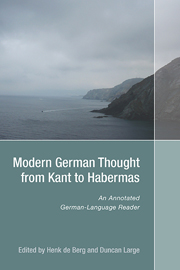Book contents
- Frontmatter
- Contents
- Acknowledgments
- Introduction: German Thought since Kant
- 1 Immanuel Kant (1724–1804)
- 2 Georg Wilhelm Friedrich Hegel (1770–1831)
- 3 Ludwig Feuerbach (1804–72)
- 4 Arthur Schopenhauer (1788–1860)
- 5 Karl Marx (1818–83)
- 6 Friedrich Nietzsche (1844–1900)
- 7 Sigmund Freud (1856–1939)
- 8 Martin Heidegger (1889–1976)
- 9 Walter Benjamin (1892–1940)
- 10 Georg Lukács (1885–1971)
- 11 Max Horkheimer (1895–1973) and Theodor W. Adorno (1903–69)
- 12 Jürgen Habermas (b. 1929)
- Index
- About the Editors
4 - Arthur Schopenhauer (1788–1860)
Published online by Cambridge University Press: 05 September 2014
- Frontmatter
- Contents
- Acknowledgments
- Introduction: German Thought since Kant
- 1 Immanuel Kant (1724–1804)
- 2 Georg Wilhelm Friedrich Hegel (1770–1831)
- 3 Ludwig Feuerbach (1804–72)
- 4 Arthur Schopenhauer (1788–1860)
- 5 Karl Marx (1818–83)
- 6 Friedrich Nietzsche (1844–1900)
- 7 Sigmund Freud (1856–1939)
- 8 Martin Heidegger (1889–1976)
- 9 Walter Benjamin (1892–1940)
- 10 Georg Lukács (1885–1971)
- 11 Max Horkheimer (1895–1973) and Theodor W. Adorno (1903–69)
- 12 Jürgen Habermas (b. 1929)
- Index
- About the Editors
Summary
Life and Work
The year 1788 stands out in the history of German philosophy for being the year in which Kant's Kritik der praktischen Vernunft was published, in Riga, and Arthur Schopenhauer was born, down the Baltic coast in Danzig (now Gdańsk, Poland), on 22 February. This contingent conjunction of the two philosophers’ lives was a happy coincidence, since Schopenhauer would in due course become one of Kant's most devoted followers (as well as one of his most stringent critics). Their lives were markedly different, though, and can perhaps be taken as symptomatic of the larger differences between the Enlightenment and the Romantic age that followed it: whereas Kant's life was well-regulated, governed by duty and rational insight, and devoted to the pursuit of knowledge, Schopenhauer's was, at least for its first forty-five years, restless, effervescent, and diverse.
Schopenhauer's father, Heinrich, was a merchant and shipowner who moved the family to Hamburg for business reasons in 1793, when Prussia annexed the free city of Danzig. This was but the first major upheaval in the life of the philosopher, who continued to travel extensively in his childhood and youth, picking up fluent competence in foreign languages as he went, and gaining the education and experience required to follow in his father's footsteps. Arthur spent two years in Le Havre (1797–99), for example, and even enrolled for three months at a boarding school in London (1803).
- Type
- Chapter
- Information
- Modern German Thought from Kant to HabermasAn Annotated German-Language Reader, pp. 97 - 122Publisher: Boydell & BrewerPrint publication year: 2012



